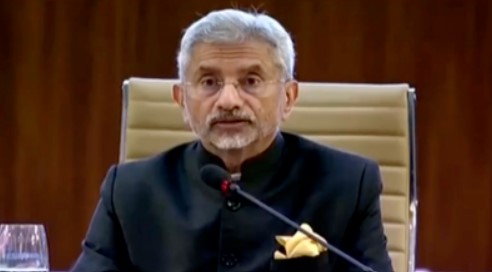Virendra Pandit
New Delhi: The ongoing Russian invasion of Ukraine, which began on February 24, 2022, cast its shadow on the last year’s G-20 meeting in Indonesia. This year, the conflict may be eclipsing the G-20 bloc’s ongoing meetings in India.
As in the recent Bengaluru meeting of finance ministers and central bank chiefs, even the key takeaway of the foreign ministers’ meetings, a joint statement, seems far-fetched.
It emerged on Thursday when US Secretary of State Antony Blinken said the G-20 meeting of foreign ministers has again been marred by Russia’s invasion of Ukraine. He also asked this bloc to call on Moscow to withdraw its forces from Ukraine.
The ongoing war has been a major sticking point at meetings of the G-20, which groups the world’s 20 largest economies and includes both the United States and Russia, as well as China. India is hosting this year’s events.
“Unfortunately, this meeting has again been marred by Russia’s unprovoked and unjustified war against Ukraine, deliberate campaign of destruction against civilian targets, and its attack on the core principles of the UN Charter,” the top U.S. diplomat told the bloc’s foreign ministers, the media reported.
India has consistently declined to blame Russia for the war, and sought a diplomatic solution, while sharply boosting its purchases of Russian oil.
The G-20 should repeat calls – agreed upon by most G-20 nations’ leaders in Bali, Indonesia, in November 2022- for Russia to end the war and withdraw for the sake of international peace and economic stability, Blinken said.
“Even as we rally support for Ukraine, we remain focused and leading on global challenges. It’s what the world needs and expects,” he added.
As the chair of G-20 this year, India has sought to avoid the bloc being dominated by the Ukraine war and emphasized a focus on food, energy, and fertilizer security that are especially impacting less wealthy nations.
Blinken said Russia has yet to agree to renew the Black Sea Grain Initiative, which facilitates the export of Ukraine’s agricultural products, before it expires on March 18.
“It is imperative the G-20 speak up on behalf of extending and expanding the (Black Sea) grain initiative to strengthen food security for the most vulnerable,” he added.
Even External Affairs Minister S. Jaishankar admitted there were “divergences” in the meetings of the G-20 and member countries could not reconcile positions on the Ukraine war after Foreign Ministers held discussions at the start of a two-day event in New Delhi under India’s presidency of the grouping.
“There were issues and very frankly they were concerned with the Ukraine conflict. There were divergences. There were differences, which could not be reconciled,” Jaishankar said, explaining why there was an ‘outcome document’ instead of a joint statement.
Both Russia and China objected again to the wording of a draft on the Ukraine war, thwarting a joint statement for the second time in a week.
Last week, a meeting of G-20 Finance Ministers and central bank chiefs in Bengaluru failed to agree on a common statement after Russia and China similarly sought to water down language on the Ukraine war. A “Chair’s Summary” was all that was published at the end of the discussions.
Dr. Jaishankar also stressed there was agreement on “the bulk of issues” involving the concerns of the global south.
“There were a large number of issues on which there was agreement, like strengthening multilateralism, promoting food and energy security, climate change, gender issues, counter-terror…On the bulk of issues which concern the global south, there was a considerable meeting of minds that has been captured by outcome document,” he said.
“If we had a perfect meeting of minds on all issues, it would have been a collective statement. In terms of the outcome document, you will see that there was almost a 90 percent agreement. Just, on two paras we were not able to get everybody on the same page – or para,” he added.
The inability to converge on a joint statement contrasts sharply with the consensus reached by leaders in Bali in November 2022. The G20 leaders’ statement had said then that “most members strongly condemned the war in Ukraine” and noted “other views and different assessments of the situation and sanctions.”
India has declined to blame Russia for the war, seeking a diplomatic solution while sharply boosting its purchases of Russian oil. To avoid its year as chair of the G-20 becoming dominated by the Ukraine war, India has called for a focus on food, energy, and fertilizer security – subjects that impact fewer wealthy nations.

